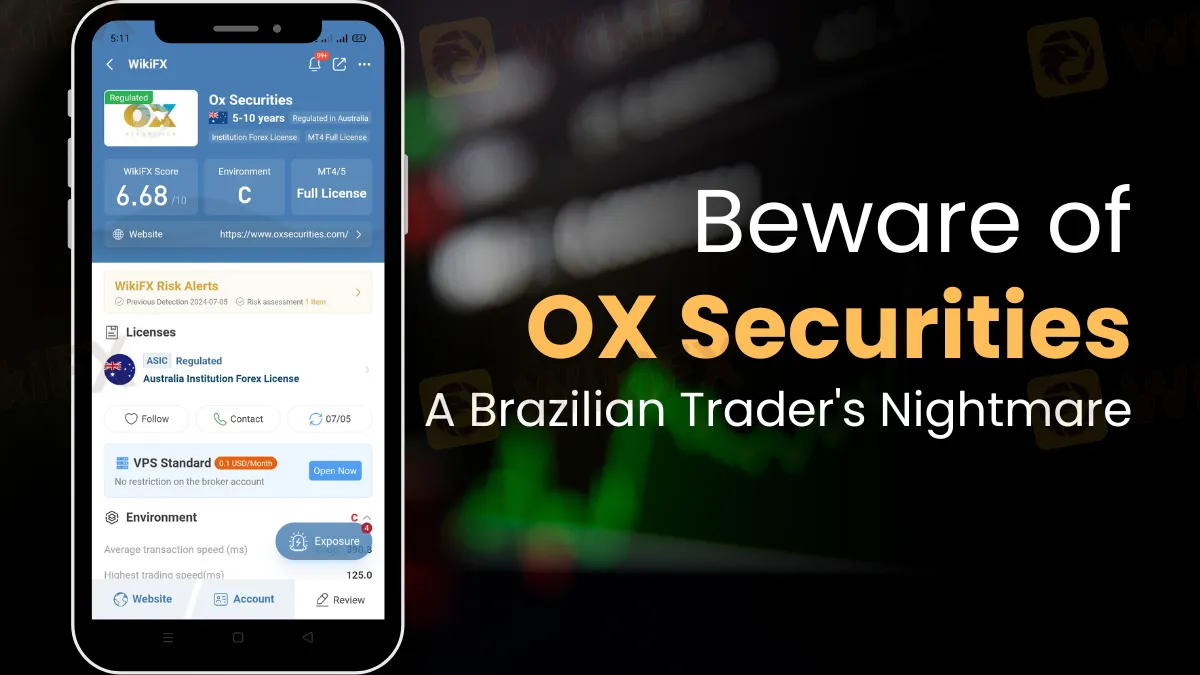简体中文
繁體中文
English
Pусский
日本語
ภาษาไทย
Tiếng Việt
Bahasa Indonesia
Español
हिन्दी
Filippiiniläinen
Français
Deutsch
Português
Türkçe
한국어
العربية
Beware of OX Securities: A Brazilian Trader's Nightmare
Abstract:A Brazilian trader's funds are blocked by OX Securities, regulated by ASIC. High-risk trading outside the jurisdiction leaves the victim without $1,538.

OX Securities, a Contract for Difference (CFD) broker regulated by the Australian Securities and Investment Commission (ASIC), has recently come under intense scrutiny. This case involves a Brazilian trader whose withdrawal of $1,538 was unjustly blocked. Despite its regulated status, trading with OX Securities outside Australias jurisdiction poses significant risks. This troubling scenario underscores the potential pitfalls traders face when dealing with brokers not regulated in their own country.

The Victims Story
An anonymous trader from Brazil decided to invest with OX Securities, starting with a modest deposit of $99.61. Attracted by the broker‘s extensive offerings in Forex, Crypto, Commodities, and Indices, the trader was initially pleased with the platform’s performance. The support team reassured the trader that crypto withdrawals would be processed within 2 to 4 hours, fostering a sense of trust and confidence. Encouraged by this, the trader engaged in trading activities and impressively amassed a profit of $1,600. However, this initial success soon turned into a nightmare.

Withdrawal Blocked
The trader's troubles began when they attempted to withdraw their hard-earned profits. Instead of the smooth transaction they were promised, the trader was informed by OX Securities' support team that the withdrawal request was under compliance review. Despite multiple attempts to seek clarity, the trader received vague responses, with customer support insisting that the finance and compliance team was handling the case. Days turned into weeks, and the trader‘s frustration grew as their funds remained inaccessible. This lack of transparency and prolonged delay in processing the withdrawal raised serious concerns about the broker’s integrity.

See the case below:
Compliance Issues
During a chat conversation, Yves Fontanilla, a representative from OX Securities, explained that the withdrawal was blocked due to an alleged violation of the Anti-Money Laundering (AML) policy, specifically citing section 6.13 of their terms and conditions. However, the trader was never given a clear explanation of what this violation entailed. Yves repeatedly insisted that only the finance and compliance team could provide further details, but despite the trader's persistent inquiries, no substantial updates were provided. This evasive behavior from the broker only added to the traders frustration and suspicion.



High-Risk Trading Outside Jurisdiction
This case highlights the inherent risks associated with trading with brokers outside their regulatory jurisdiction. Although OX Securities is regulated by ASIC in Australia, this regulation does not extend to Brazil, leaving the trader without the protections that would typically be available to Australian clients. This situation serves as a critical reminder that traders must be vigilant about the regulatory boundaries and legal protections when engaging with international brokers. The lack of jurisdictional oversight can lead to significant financial vulnerabilities, as evidenced by this trader's unfortunate experience.
Read the complete article below:
Conclusion
Despite OX Securities regulated status, this case serves as a stark reminder of the potential dangers when trading outside a broker's regulatory jurisdiction. Traders should exercise extreme caution and thoroughly research the legal protections available in their own countries before engaging with international brokers. The anonymous trader's ordeal with OX Securities underscores the importance of understanding the risks and ensuring adequate regulatory safeguards are in place before investing significant sums.

Disclaimer:
The views in this article only represent the author's personal views, and do not constitute investment advice on this platform. This platform does not guarantee the accuracy, completeness and timeliness of the information in the article, and will not be liable for any loss caused by the use of or reliance on the information in the article.
Read more

Authorities Alert: MAS Impersonation Scam Hits Singapore
MAS scam alert: Scammers impersonate officials, causing $614K losses in Singapore since March 2025. Learn how to spot and avoid this impersonation scam.

Billboard Warns of Crypto Scams Using Its Name – Stay Alert!
Billboard warns against fake crypto scams using its brand. Learn how to spot fraud and protect yourself from fake promotions.

The Impact of Interest Rate Decisions on the Forex Market
Interest rate changes determine currency attractiveness, influencing capital flows and exchange rate trends. Understanding this mechanism helps investors navigate the forex market effectively.

Rising WhatsApp Scams Highlight Need for Stronger User Protections
UK consumers lose £2,437 on average to WhatsApp scams. Revolut demands stricter verification and AI monitoring to combat rising fraud on Meta platforms.
WikiFX Broker
Latest News
The Withdrawal Trap: How Scam Brokers Lure Victims into Paying More
FCA to Investors: Think Twice Before Trusting These Brokers
Trump\s tariffs: How could they affect the UK and your money
Trump gambles it all on global tariffs he\s wanted for decades
TradingView Brings Live Market Charts to Telegram Users with New Mini App
Trump tariffs: How will India navigate a world on the brink of a trade war?
Interactive Brokers Launches Forecast Contracts in Canada for Market Predictions
Authorities Alert: MAS Impersonation Scam Hits Singapore
Stocks fall again as Trump tariff jitters continue
IG Group Acquires Freetrade for £160M to Expand UK Investment Market
Currency Calculator







